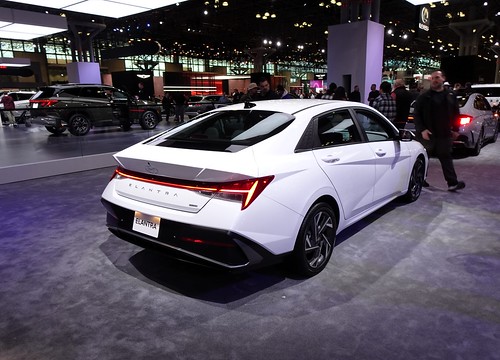As the automotive industry races towards a more sustainable and technologically advanced future, Hyundai has emerged as a key player, pushing boundaries with its latest innovations. The year 2024 marks a significant leap forward for the South Korean automotive giant, showcasing advancements that are set to redefine the driving experience and the company’s role in the global mobility landscape. This article delves into Hyundai’s 2024 innovations, exploring groundbreaking technologies, new models, and the company’s strategic vision for the future.
1. Revolutionizing Electric Vehicles: The Hyundai Ioniq 7
Hyundai’s commitment to electric vehicles (EVs) is evident in the launch of the Ioniq 7, a flagship model that sets new standards for electric mobility. The Ioniq 7 is a large, all-electric SUV that combines cutting-edge technology with a focus on sustainability and user comfort.
1. Advanced Battery Technology
The Ioniq 7 features Hyundai’s latest battery technology, which significantly extends driving range and reduces charging time. Key advancements include:
- High-Energy-Density Cells: The new battery cells offer a range of up to 350 miles on a single charge, addressing one of the most critical concerns for EV users.
- Ultra-Fast Charging: With 800-volt architecture, the Ioniq 7 supports ultra-fast charging, capable of replenishing up to 80% of the battery in just 18 minutes.
- Improved Thermal Management: Enhanced cooling systems help maintain optimal battery performance and longevity.
2. Intelligent Interior Design
The Ioniq 7’s interior is designed with a focus on user experience and adaptability. Notable features include:
- Flexible Seating: The cabin includes configurable seating options, allowing users to adapt the interior layout for various needs, from family trips to cargo space.
- Augmented Reality Head-Up Display: This advanced HUD provides real-time navigation and vehicle information projected directly onto the windshield.
- Sustainable Materials: The use of eco-friendly materials throughout the interior reflects Hyundai’s commitment to sustainability.
3. Autonomous Driving Capabilities
The Ioniq 7 is equipped with Hyundai’s latest autonomous driving technologies, including:
- Level 3 Autonomy: The vehicle supports hands-free driving in certain conditions, leveraging a suite of sensors and cameras to navigate safely.
- Advanced Driver Assistance Systems (ADAS): Features such as adaptive cruise control, lane-keeping assist, and automatic emergency braking enhance safety and convenience.
2. Smart Mobility Solutions: Hyundai’s Urban Air Mobility
Hyundai is also pioneering innovations in urban air mobility (UAM), aiming to alleviate congestion and provide new transportation options for urban areas. The company’s approach includes the development of electric vertical takeoff and landing (eVTOL) aircraft.
1. The Hyundai eVTOL Aircraft
Hyundai’s eVTOL aircraft represents a significant advancement in personal air transport. Key features include:
- Electric Propulsion: The aircraft is powered by electric engines, reducing emissions and noise pollution compared to traditional helicopters.
- Vertical Takeoff and Landing: Its ability to take off and land vertically makes it ideal for urban environments with limited space.
- Autonomous Flight Capabilities: The eVTOL is designed with autonomous flight systems to enhance safety and ease of operation.
2. Integration with Existing Transportation Networks
Hyundai envisions a seamless integration of eVTOL aircraft into existing transportation infrastructures, including:
- Vertiports: Dedicated landing and takeoff zones within urban areas to support eVTOL operations.
- Mobility-as-a-Service (MaaS) Platforms: Integration with MaaS platforms to provide users with a unified mobility experience, combining ground and air transport options.
3. Sustainability and Eco-Friendly Initiatives
Hyundai’s 2024 innovations also emphasize environmental responsibility, with several initiatives aimed at reducing the company’s carbon footprint and promoting sustainability.
1. Green Manufacturing Practices
Hyundai is adopting greener manufacturing practices to minimize environmental impact. Notable initiatives include:
- Energy-Efficient Production Facilities: New manufacturing plants are designed with energy-saving technologies and renewable energy sources.
- Recycled Materials: The use of recycled materials in vehicle production helps reduce waste and resource consumption.
Also Read : Personalize Your Ride: Hyundai 2024 Accessories
2. Hydrogen Fuel Cell Technology
In addition to electric vehicles, Hyundai continues to invest in hydrogen fuel cell technology. The company’s hydrogen-powered models, such as the Hyundai Nexo, showcase the potential of this clean energy source:
- Zero Emissions: Hydrogen fuel cells produce only water vapor as a byproduct, making them a truly zero-emission alternative to conventional vehicles.
- Extended Range: Vehicles powered by hydrogen fuel cells offer longer driving ranges compared to many battery-electric vehicles.
3. Carbon Neutrality Goals
Hyundai has set ambitious targets for carbon neutrality, aiming to achieve:
- Net Zero Emissions by 2045: The company plans to reduce its carbon footprint across all operations and products.
- Investment in Renewable Energy: Increased investment in renewable energy sources and energy-efficient technologies to support its carbon neutrality goals.
4. The Future of Hyundai’s Innovations
Looking ahead, Hyundai’s commitment to innovation and sustainability is expected to drive further advancements in automotive technology and mobility solutions. Key areas of focus include:
1. Expansion of EV Lineup
Hyundai plans to expand its electric vehicle lineup, introducing new models and enhancing existing ones to meet the growing demand for sustainable transportation options.
2. Collaboration and Partnerships
The company is actively pursuing collaborations with technology firms, research institutions, and government agencies to advance its research and development efforts. These partnerships are crucial for accelerating innovation and bringing new technologies to market.
3. Advancements in AI and Connectivity
Hyundai is exploring the integration of artificial intelligence and advanced connectivity features in its vehicles. Future innovations may include:
- Enhanced AI-Powered Assistants: More sophisticated voice and gesture control systems for improved user interaction.
- Vehicle-to-Everything (V2X) Communication: Technology that allows vehicles to communicate with each other and infrastructure, improving traffic flow and safety.
Conclusion
Hyundai’s 2024 innovations reflect a strong commitment to advancing automotive technology and promoting sustainability. With groundbreaking developments in electric vehicles, smart mobility solutions, and eco-friendly practices, Hyundai is not only shaping the future of transportation but also setting a benchmark for the industry. As the company continues to push boundaries and explore new frontiers, it will undoubtedly play a pivotal role in defining the next era of mobility.
(source)
Originally posted 2024-08-22 03:06:41.
